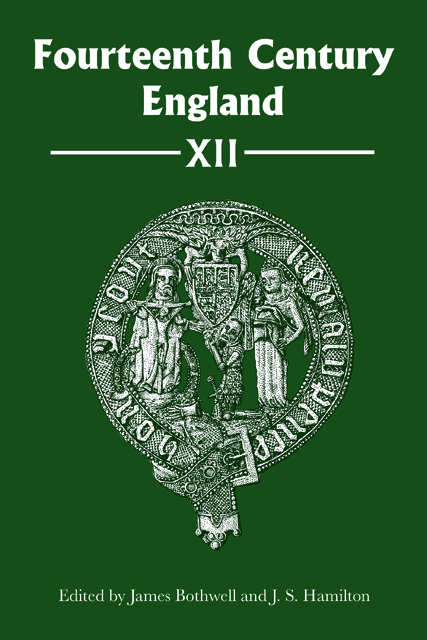Book contents
- Frontmatter
- Contents
- List of Illustrations
- List of Contributors
- Preface
- Abbreviations
- The King’s Confessors and the Royal Conscience in Late Medieval England
- ‘Such maintenance as …’: Corrodies of the Crown
- ‘Vos maisons sount pris al eops le counte’: Walter Bedwyn, Treasurer of York, and the Return of Piers Gaveston
- The Deposition of Edward II: The Kenilworth Embassies
- The English Parliament and the Trial of the ‘Peers of the Land’ in Henry of Lancaster’s Revolt (1328–29): The Origins of a Privilege
- A Brotherhood Uncovered: Investigating the Knightly Following of Thomas Beauchamp, earl of Warwick, 1329–69
- The Black Death and Clerical Prospects in England
- The Last of the Duketti? Richard II, Henry of Monmouth and the House of Lancaster
- Confusion Confounded? The Contrasting Military Fortunes of Sir William Neville (d. c.1391) and Sir William Neville of Pickhill and Rolleston (d. c.1420)
The English Parliament and the Trial of the ‘Peers of the Land’ in Henry of Lancaster’s Revolt (1328–29): The Origins of a Privilege
Published online by Cambridge University Press: 11 January 2023
- Frontmatter
- Contents
- List of Illustrations
- List of Contributors
- Preface
- Abbreviations
- The King’s Confessors and the Royal Conscience in Late Medieval England
- ‘Such maintenance as …’: Corrodies of the Crown
- ‘Vos maisons sount pris al eops le counte’: Walter Bedwyn, Treasurer of York, and the Return of Piers Gaveston
- The Deposition of Edward II: The Kenilworth Embassies
- The English Parliament and the Trial of the ‘Peers of the Land’ in Henry of Lancaster’s Revolt (1328–29): The Origins of a Privilege
- A Brotherhood Uncovered: Investigating the Knightly Following of Thomas Beauchamp, earl of Warwick, 1329–69
- The Black Death and Clerical Prospects in England
- The Last of the Duketti? Richard II, Henry of Monmouth and the House of Lancaster
- Confusion Confounded? The Contrasting Military Fortunes of Sir William Neville (d. c.1391) and Sir William Neville of Pickhill and Rolleston (d. c.1420)
Summary
The medieval English parliament has a venerable historiography. Some areas of particular historical significance have been much discussed with reference to the fourteenth century in particular: the consolidation of the parliamentary Commons as a force in its own right, the need for parliamentary consent to direct and indirect grants of taxation, a rise and then decline in private petitioning in parliament, the beginnings of common petitions and, from 1341, the existence of a regular series of parliament rolls in a recognizably ‘late medieval’ form. One of the areas considered as part of this wider historiography is the consolidation of a parliamentary peerage, a subject of importance to social historians interested in social gradation as well as to peerage lawyers and historians of parliament. As is well known, the increasing stability of summonses issued to members of the same aristocratic families marked out a hereditary parliamentary peerage in England by 1400; and this development of the fourteenth century was in turn crucial to the formation of a distinct ‘House’ of Lords.
One of the rights which came to be enjoyed by peers sitting in the Upper House was the right to be tried for treasons, felonies and trespasses by their peers in parliament, rather than by a jury of commoners. This privilege of peerage was built on Chapter 29 of the 1225 Magna Carta, as is conveniently shown in numerous fifteenth-century readings on Chapter 29 given in the Inns of Court. It is the origin of this right (in its English context in particular) which forms the subject of this essay. The intention here is to revisit the question of its chronology in light of an understudied episode – an unsuccessful revolt by Henry, earl of Lancaster, in 1328 – and to suggest that this needs to be worked into our understanding of the topic. More broadly, the intention is to disturb a historiography of a parliamentary privilege which – latently, but nonetheless – seems to have underestimated the instability surrounding its early application. We will begin with a more detailed tour of the historiography of the medieval origins of trial by peers in the English parliament before turning to the events on which it is based.
- Type
- Chapter
- Information
- Fourteenth Century England XII , pp. 79 - 98Publisher: Boydell & BrewerPrint publication year: 2022

